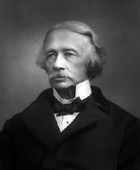|
Coventry Patmore was a librarian by profession, and originally an Anglican by creed, but he later converted to Catholicism. Inspired by his new religion, he composed some of his best religious poetry, prolific in both quality and quantity. To fellow lyricist Francis Thompson, Patmore was indeed "the greatest genius of the century." Together, both Patmore and Thompson brought English religious poetry to unexpected, perhaps unsurpassable heights. From childhood to grave Patmore believed himself obligated to celebrate married love, "the more serious importance of which had been singularly missed by most poets of all countries" he once said. As time went on, this theme became spiritualized in his mind. There can really be only one story of happy married love, and when he finally adopted a form for it, it ultimately resembled the scenario of a novel by Anthony Trollope. This quality, the trivial realism of the narrative of The Angel of the House, attracted a multitude of readers, and at the same time obscured the splendor of the essential part of the poem. Patmore's ultimate success consisted not in the mild adventure of Honoria and her spouse, but in the magnificence of the philosophical episodes, in which the psychology of love is illustrated in language of great originality. Among Patmore's well-known poems are "The Toys," "A Farewell," "If I were Dead," "Departure," and "Auras of Delight." ... |






